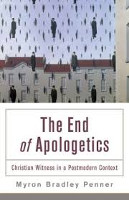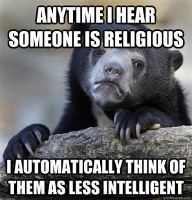 Myron Bradley Penner, The End of Apologetics: Christian Witness in a Postmodern Context (Grand Rapids: Baker Academic, 2013) (Follow this link to get the book in electronic format from Logos.)
Myron Bradley Penner, The End of Apologetics: Christian Witness in a Postmodern Context (Grand Rapids: Baker Academic, 2013) (Follow this link to get the book in electronic format from Logos.)
Full disclosure: I do not publicly label myself an “apologist.” However, in some ways that’s what I am just by virtue of many of the things that I do and say, and there are others who refer to me that way. At times I defend the truth claims of Christianity against criticisms, and at times I offer reasons for thinking that those claims are true. That is what “apologetics” means here. I have my share of problems with the “apologetics culture,” if I can speak of any such thing. But I appreciate the fact that I can separate apologetics per se from the various cultural forms in which it is expressed.
Myron Penner quite openly does not have this appreciation, or indeed much regard at all for the practice of Christian apologetics. What follows is my review of his book where he explains himself. The review is not exhaustive, so there may well be times where somebody reading this review might note “but you didn’t note that Penner says….” I probably did not. But I have read it, and if I didn’t mention it here it’s because I think that what I do say here takes it into account.
Further disclosure: Given some of my reservations about certain aspects of the apologetics culture, I expected that I might find at least a considerable amount of agreement with this book. But I may as well honestly say that I did not. I disagreed with nearly all of it, and also found it disagreeable (those two reactions are quite different from each other).
Here goes…


 Occasionally, when somebody first hears about divine command ethics (the view that what is right or wrong is what God commands or forbids), the response is one of incredulity: “What? You believe THAT?! So if God commanded you to kill that person over there, you would do it? Really?” And right there, whether the critic realises it or not, there is almost certainly a double standard at work. Read on to see why.
Occasionally, when somebody first hears about divine command ethics (the view that what is right or wrong is what God commands or forbids), the response is one of incredulity: “What? You believe THAT?! So if God commanded you to kill that person over there, you would do it? Really?” And right there, whether the critic realises it or not, there is almost certainly a double standard at work. Read on to see why. Is believing in the resurrection of Jesus as foolish as falling for somebody’s tall-tale about teleportation? Recently James East brought to my attention his short article where he calls into question the “minimal facts” approach to arguing for the resurrection of Jesus of Nazareth. How well does his objection fare? Not especially well, as it turns out.
Is believing in the resurrection of Jesus as foolish as falling for somebody’s tall-tale about teleportation? Recently James East brought to my attention his short article where he calls into question the “minimal facts” approach to arguing for the resurrection of Jesus of Nazareth. How well does his objection fare? Not especially well, as it turns out. A number of people are linking to and commenting about a
A number of people are linking to and commenting about a  If there are good reasons to believe, then why does the Christian faith have some really vehement detractors?
If there are good reasons to believe, then why does the Christian faith have some really vehement detractors? In this episode I continue to re-trace my steps through my mini speaking tour earlier this year. This talk was the second in a series of introductory talks on apologetics. In it, I introduce and explain the moral argument for the existence of God.
In this episode I continue to re-trace my steps through my mini speaking tour earlier this year. This talk was the second in a series of introductory talks on apologetics. In it, I introduce and explain the moral argument for the existence of God. What’s the role of reason in faith?
What’s the role of reason in faith?